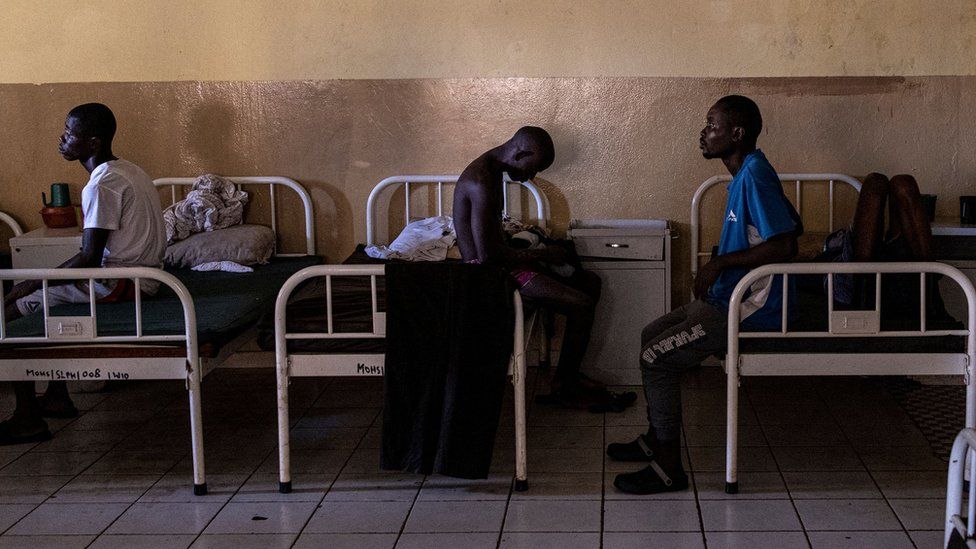Sierra Leone declares emergency over drug kush - made from human bones
- Published

Sierra Leone's president has declared a national emergency over rampant drug abuse.
Kush, a psychoactive blend of addictive substances, has been prevalent in the country for years.
President Julius Maada Bio called the drug a "death trap" and said it posed an "existential crisis".
One of the drug's many ingredients is human bones - security has been tightened in cemeteries to stop addicts digging up skeletons from graves.
Groups of mostly young men sitting on street corners with limbs swollen by kush abuse is a common sight in Sierra Leone.
With a bandage around his ankle, one recovering addict told the BBC the drug has a tight grip on him.
"I don't like doing this, but I cannot leave it because I enjoy it," he said.
There is no official death toll, but one doctor told the BBC that "in recent months" hundreds of young men had died from organ failure caused by kush in the capital, Freetown.
The psychoactive substance also takes a toll on mental health - the Sierra Leone Psychiatric Hospital, the country's only institution of its kind, says between 2020 and 2023, admissions linked to kush surged by almost 4,000% to reach 1,865.
And the spike in kush use has seen Freetown's main cemeteries request police security to protect themselves from young men digging up skeletons - ground-up human bone is one of the many ingredients used to make kush, although it is not clear why.
In a nationwide broadcast on Thursday night, President Bio said: "Our country is currently faced with an existential threat due to the ravaging impact of drugs and substance abuse, particularly the devastating synthetic drug kush."
He added that there had been "escalating fatalities" among kush users.
The president also directed officials to set up a National Task Force on Drugs and Substance Abuse, which will primarily focus on "combatting the kush crisis".
He said centres will be set up in every district and "adequately staffed by trained professionals to offer care and support to people with drug addiction".
At present, Freetown is home to the country's only functioning drug rehabilitation centre. The 100-bed facility was hurriedly set up in an army training centre earlier this year.
Experts have described it as "more of a holding centre than a rehab" because of its lack of adequate facilities.
As well as addressing treatment, the president said law enforcement agencies should "dismantle the drug supply chain through investigations, arrests, and prosecutions".
Deputy Mayor of Freetown Kweku Lisk told the BBC that his office had requested security from the police in order to tackle gravediggers.
At the moment, there is a night-time police deployment at the Kissy Road cemetery, a large unfenced site in an eastern suburb.
Mr Bio's administration has been criticised by people who say it lacks the strategy and drive to respond to kush abuse.
"Such is the vacuum left by the lack of adequate response that communities have often had to take the law into their own hands and have responded to the crisis sometimes in a disjointed and crude manner", said a foreign diplomat in Sierra Leone.
This sentiment has been echoed by callers on some local radio talk shows and on social media.
Dr Abdul Jalloh, head of the Sierra Leone Psychiatric Hospital, said Mr Bio's emergency declaration is "the right step" and will be "crucial in addressing drug use".
"It signifies the prioritisation of resources, attention and intervention to combat this growing epidemic," he said.
Some 63% of the hospital's current patients were admitted with kush-related problems.
Marie, a mother who lost her 21-year-old son to kush, said: "There is a lot the authorities must do beyond the president's address last night to combat this scourge."